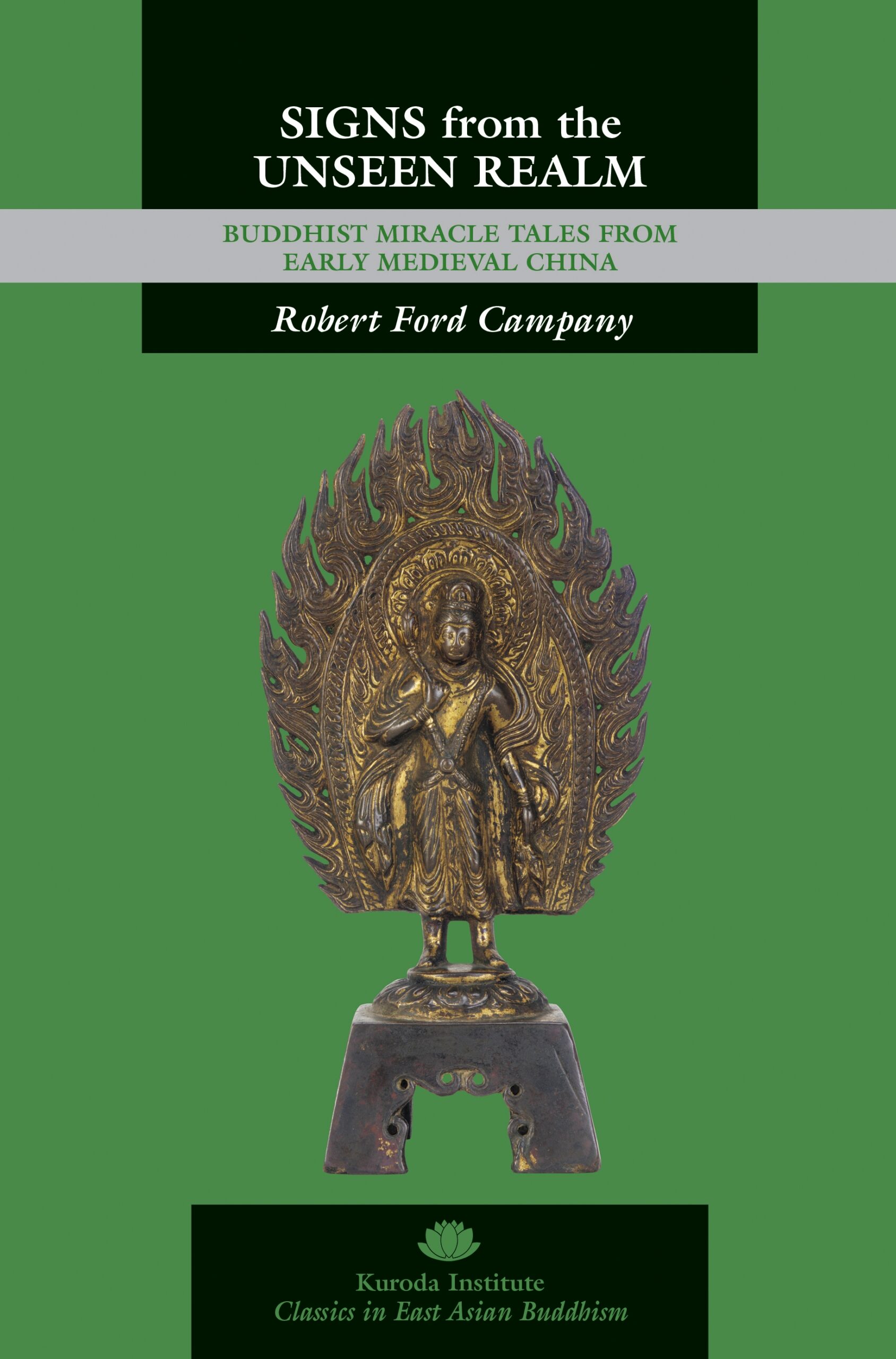Signs from the Unseen Realm: Buddhist Miracle Tales from Early Medieval China
- About the Book
-
In early medieval China hundreds of Buddhist miracle texts were circulated, inaugurating a trend that would continue for centuries. Each tale recounted extraordinary events involving Chinese persons and places—events seen as verifying claims made in Buddhist scriptures, demonstrating the reality of karmic retribution, or confirming the efficacy of Buddhist devotional practices. Robert Ford Campany, one of North America’s preeminent scholars of Chinese religion, presents in this volume the first complete, annotated translation, with in-depth commentary, of the largest extant collection of miracle tales from the early medieval period, Wang Yan’s Records of Signs from the Unseen Realm, compiled around 490 C.E.
In addition to the translation, Campany provides a substantial study of the text and its author in their historical and religious settings. He shows how these lively tales helped integrate Buddhism into Chinese society at the same time that they served as platforms for religious contestation and persuasion. Campany offers a nuanced, clear methodological discussion of how such narratives, being products of social memory, may be read as valuable evidence for the history of religion and culture.
Readers interested in Buddhism; historians of Chinese religions, culture, society, and literature; scholars of comparative religion: All will find Signs from the Unseen Realm a stimulating and rich contribution to scholarship.
- About the Author(s)
-
Robert Ford Campany, Author
Robert Ford Campany is Gertrude Conway Vanderbilt Chair in the Humanities and professor of Asian studies and religions at Vanderbilt University.Robert Ford Campany, Translator
Robert Ford Campany is Gertrude Conway Vanderbilt Chair in the Humanities and professor of Asian studies and religions at Vanderbilt University.Robert Ford Campany, Translator
Robert Ford Campany is Gertrude Conway Vanderbilt Chair in the Humanities and professor of Asian studies and religions at Vanderbilt University.
- Reviews and Endorsements
-
- The book is a comprehensive study and annotated translation with commentaries of Mingxiang ji, a collection of Buddhist miracle tales. As a translation and study of zhiguai literature, Campany's book has surpassed all previous endeavors by other scholars of the genre in terms of its comprehensiveness, depth, and texture.
—Sing-Chen Chiang, Boston College - Taken as a whole, the translation itself is refined, readable, and reliable. Campany has again set a new high standard for annotated translations of Chinese classics. As the most complete, extensively annotated Western-language translation of the Mingxiang ji, Campany's book is a very welcome addition to the expanding scholarship on the zhiguai genre in general and Buddhist miracle tales of the Six Dynasties in particular.
—Xiaohuan Zhao, University of Sydney, China Review International, 19:2 (2012) - The study of lived religion is a corrective to the traditional focus on canons and scriptures, which often leads to constructions of religions that are prescriptive rather than descriptive, and more expressive of elite minority sentiments, concerns, and speculation than of the practices carried out by the majority of people. . . . Campany reminds us that, while religions may be institutions, we often forget that they are social agglomerations that consist of people with basic concerns.
—Gil Raz, Dartmouth College, T’oung Pao, 99 (2013) - These brief anecdotes, none more than a few pages in translation, recount the adventures of men who died and returned from the underworld to describe the world beyond, of prisoners saved from unjust punishment through their devotion to Guanyin, of ghosts and demons, magical books and startling experiences that reveal the workings of karma. . . . The translations are clear, accurate and colloquial, reflecting an awareness of the difficulties inherent in translation and the merits of rendering difficult terms in language that is easily understood.
—John Kieschnick, Stanford University, Bulletin of the School of Oriental and African Studies, 76:1 (2013) - "Taken together, the translation and study are valuable both for scholars and for undergraduates in courses on Buddhism, religious literature or Chinese religion." —<i>Bulletin of the School of Oriental and African Studies</i> (76:1, 2013) <p> "Taken as a whole, the translation itself is refined, readable, and reliable. Campany has again set a new high standard for annotated Western-language translation of the <i>Mingxiang ji</i>, Campany's book is a very welcome addition to the expanding scholarship on the <i>zhiguai</i> genre in general and Buddhist miracle tales of the Six Dynasties in particular." —Xiaohuan Zhao, <i>China Review International</i> (19:2, 2012) <p> "The book is a comprehensive study and annotated translation with commentaries of <i>Mingxiang ji</i>, a collection of Buddhist miracle tales. As a translation and study of <i>zhiguai</i> literature, Campany's book has surpassed all previous endeavors by other scholars of the genre in terms of its comprehensiveness, depth, and texture." —Sing-Chen Chiang, Boston College
—https://www.uhawaiipress.com/p-8618-9780824836023.aspx
- The book is a comprehensive study and annotated translation with commentaries of Mingxiang ji, a collection of Buddhist miracle tales. As a translation and study of zhiguai literature, Campany's book has surpassed all previous endeavors by other scholars of the genre in terms of its comprehensiveness, depth, and texture.
- Supporting Resources
-





